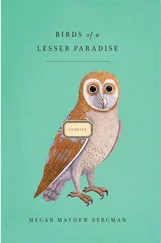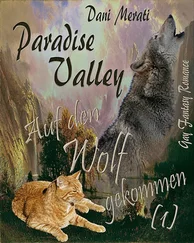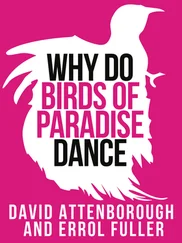“I guess.” Felice glances at Nieves’s stomach. “Do you think you know something like that right now?”
“That’s the trouble. You can’t know until you let yourself know.” Her head falls back to rest on the back of the bench. “It’s like my mother had this story — I mean she had like a thousand stories. But there was this one I really loved. I used to think it was true. About a girl — she was really pretty and nice and smart and she lived with her mother in Florida. Just the two of them. But there was this guy? He was like, he did construction work, I think. Welding. He was totally into this girl, but she wouldn’t even, you know, even look at him. He was rough and tough, like this bearded mountain-man type? So one day she was walking by the construction site and he couldn’t stop looking at her and suddenly he just went crazy and like stole her. He grabs her and takes her like to the coldest place he can find, this freezing tiny island way, way north. I mean it’s so cold and so far away, there’s no other people and nothing grows there but little gnarly trees and little seabirds, but way off in the distance, so you can’t even hear them. And he keeps her there with him in this little cabin and makes her probably like his love slave.”
“Right, right,” Felice says, listening, her eyes closed.
“So of course her mother goes berserk. Just insane. She starts looking for her daughter everywhere. She goes all over the world, asking everyone she sees. And one day she spots one of those little seabirds and she gets a hunch and follows it back to the freezing island and she finds her daughter.”
“This is supposed to be true?”
“Don’t worry about it. This is the short version, I’m leaving tons of stuff out. Anyway, the mountain man says he won’t give her up and the mother begs and pleads with him. So finally they work out a deal — the girl can go back and be with her mother for part of the year, and the rest of the time she has to go live on the freezing island with the guy.” Nieves sighs and smiles and adjusts her weight on the bench. “That’s pretty much it. That’s the story. I guess I just loved thinking about the mother going and finding her daughter and getting her back like that. But the part that I never got? Was why did the girl keep going back to the freezing island? You know, like why didn’t she just stay and hide with her mom somewhere?”
“Maybe she really fell in love with the welder guy.”
“Yeah. I thought of that. But I also thought, you know, I bet she liked going away to the little cold island. She liked being far away and hidden from everything. Getting a break from her mom. She loved her but she always thought her mom was going to eat her alive.”
Felice doesn’t say anything. It seems like a sad story to her — like the girl never gets to have anything of her own — trapped on either side of things, between the cold and hot places. Felice can remember feeling when she was little that she might get burned up in her mother’s gaze. She’d thought that’s what love was — like a furnace. But yesterday in Stanley’s office, her mother had stared at her. Then, just like that, she stopped, her gaze fell, and something tipped inside of Felice. She feels it there now, subtle as a gesture: it is still falling, looping through the air. Another memory comes to her — something that’s been happening since she’s returned, as if a chest filled with fragments of her childhood has swung open. She thinks about a handmade ceramic bowl — a wedding present to her parents from her mother’s mother — enormous yet almost paper-fine, light as silk. It was painted lavender and sea blue and a ring of silver fish swam between its bands of color. One day, when Felice was six or seven, she was alone with the bowl, tall enough to reach its protected shelf: she picked it up, turning it, admiring its colors. But somehow she lost her balance and the thing dropped out of her fingers, shattering on the floor.
Felice gasped, then burst into tears, inconsolable. Her mother rushed into the room. Instead of scolding her, Avis knelt beside her, lifted the biggest shard, and smashed it on the floor. “See?” she said. “We broke it together.”
That was what Felice had kept trying to say to her mother yesterday. Seeing her again in Stanley’s office, the old memory of the bowl had returned to Felice: that moment of closeness. “We broke it together,” she said, caught in some crosscurrent — angry and hurt and full of wondering, helpless love, afraid to let go of her mother for even an instant.
Felice sits quietly, feeling the looping circle, the remnants of long-suppressed grief. Now she misses her parents with a vividness she hadn’t felt over their five years apart — as if she hadn’t had to feel the loss as long as she’d kept them at a distance. She almost can’t bear to go to Portland, but as much as she wants to stay she wants to see if these new feelings will remain with her, to test the edges and see if she’ll still want to come back after she’s been away. And she’s gotten used to the rigors and energy of movement: she isn’t ready yet to ease back into the comforts of a family. She’ll return soon, she thinks, but not yet. There’s a long, faint call of gulls, soft as if the cries were a gradient of the air, its streaks of dampness and old rain. She listens to the birds, an arm draped along the bench, and her eyes slip back to Nieves’s stomach.
“You can touch her,” Nieves says, and smooths her shirt down. “Lately everyone does. I think she’s still sleeping right now, though. Or he.”
Felice moves her palm shyly over the rising curve, brings her face close and says, “Hello in there, baby.” There’s a flutter under her hand and she sits up and looks at Nieves, who is laughing. “She heard you,” Nieves says.
“For real? Did she?”
She shrugs. “Sure, I guess. Why not? They’ve got ears and stuff.”
Felice gazes solemnly at her stomach. “Can I hear her?”
“That I don’t know.” She pats her belly again. “Try if you want.”
Felice considers for a moment, then she turns on the bench and lies back, lowering her head to Nieves’s lap. Her ear presses against her stomach, and as she watches the dwindling streaks of clouds she waits. Gradually she makes out small sounds, a distant riverine gurgle. “Oh. Oh my God. Is that her?”
“It’s probably just that I haven’t had breakfast.”
Felice puts her hand on the top arc of belly and presses her ear in close and she’s almost certain now she hears a low, steady murmur. “Hi baby,” she says. “Here I am. It’s Felice.” She seems to hear tiny motes, a far-off pulse like the movements of fish. The clouds unravel over their heads and Felice shades her eyes with one hand. Beyond the sound of the traffic there’s a noise, a rip in the air. Unidentifiable and syncopated, it lifts, voices torn from the high branches. Felice watches as a flock of birds rises over their heads and curls into the white sky. She watches its progress and she holds herself silent and very still, waiting for what will come.
For invaluable advice, assistance, and guidance, my deep gratitude to Nanci Lanza, Stephanie Pacheco, Jose Pacheco Silva, Yesenia Balseiro, Bertha Vazquez, Cristina Nosti, Adrienne and Frank Curson, Sara Fain, Ellen Kanner, Mitchell Kaplan, Daniel Kaplan, Barbara Goldman, and Sally Richardson. Special thanks to Alane Salierno Mason, Joy Harris, Sarah Twombly, Denise Scarfi, and Andrea Gollin, who were heroic and steadfast and made this book possible. And thanks most of all to Scott Eason, who read every draft, and thought about, talked about, and paced through this book right beside me.
BIRDS OF PARADISE BY Diana Abu-Jaber
Читать дальше












